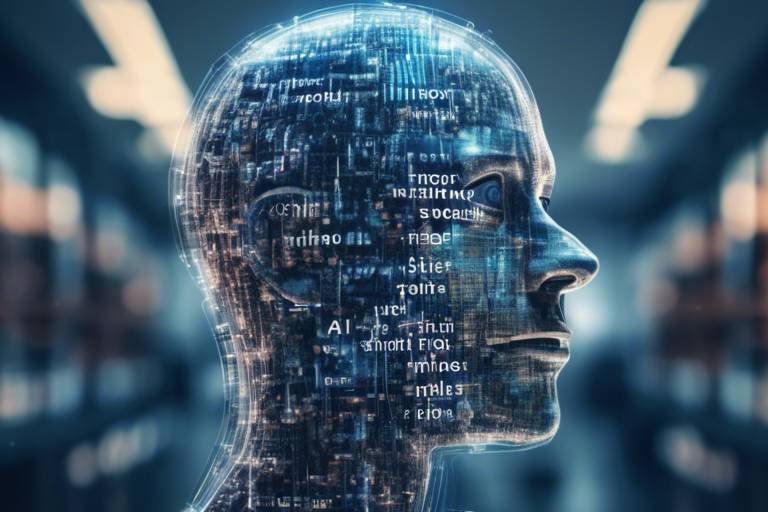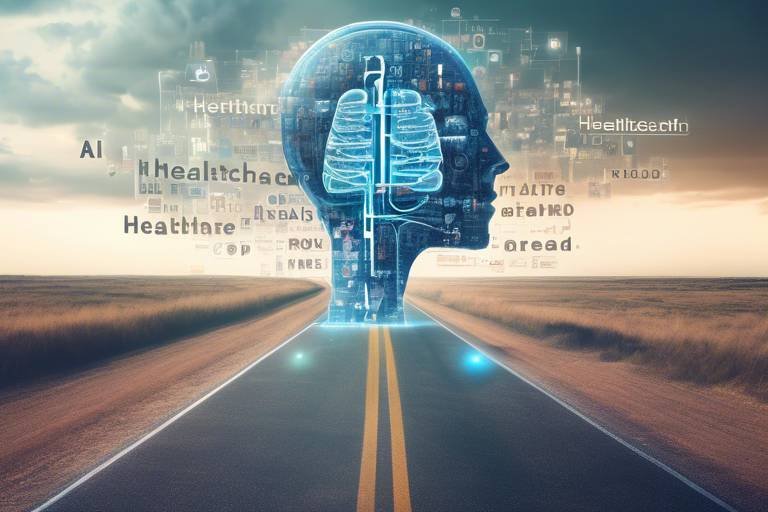Patient Care in the Future: Role of AI
As we stand on the brink of a new era in healthcare, the role of artificial intelligence (AI) is becoming increasingly pivotal in transforming patient care. Imagine a world where diagnoses are made with lightning speed, treatment plans are tailored specifically to you, and healthcare providers can predict complications before they even arise. This is not just a futuristic dream; it’s happening right now! With advancements in technology, AI is reshaping how we approach health and wellness, enhancing the overall experience for both patients and healthcare professionals alike.
In the past, patient care often felt like a one-size-fits-all approach, where treatments were based on generalized data rather than individual needs. However, the integration of AI is changing that narrative. By analyzing vast amounts of data, AI can identify patterns and insights that would be nearly impossible for humans to detect alone. This evolution is not just about improving efficiency; it’s about enhancing patient outcomes and ensuring that everyone receives the best possible care tailored to their unique circumstances.
One of the most exciting aspects of AI in healthcare is its ability to enhance diagnostics. Traditional diagnostic methods can be time-consuming and sometimes inaccurate. But with AI, we are witnessing a revolution in how medical images and data are analyzed. Think of AI as a supercharged assistant for healthcare providers, sifting through mountains of data to pinpoint issues quicker and more accurately. This means that diseases can be detected earlier, leading to timely interventions that can save lives.
Moreover, the future of patient care is not just about technology; it’s about creating a collaborative environment where healthcare professionals and AI work hand in hand. Imagine walking into a doctor's office where your medical history, lifestyle choices, and even genetic information are analyzed in real-time, allowing your doctor to make informed decisions that are as unique as you are. This level of personalized care is what AI promises to deliver, making healthcare not just reactive but also proactive.
As we delve deeper into the world of AI, we must also consider the ethical implications that come with it. Questions surrounding data privacy, consent, and algorithmic bias are more important than ever. It's crucial for stakeholders in the healthcare industry to engage in ongoing discussions to navigate these challenges responsibly. After all, the goal is to ensure that AI serves all patients equitably, without reinforcing existing disparities in healthcare access and quality.
In conclusion, the future of patient care, powered by AI, is bright and full of potential. As we embrace these technologies, we must remain vigilant about the ethical considerations and strive for a healthcare system that is not only efficient but also fair and inclusive. The journey has just begun, and it's up to us to shape it in a way that benefits everyone involved.
- How is AI currently being used in patient care? AI is being used for diagnostics, personalized treatment plans, predictive analytics, and real-time monitoring of patient health.
- What are the ethical concerns related to AI in healthcare? Key concerns include data privacy, consent, and algorithmic bias, which need to be addressed to ensure equitable healthcare for all.
- Will AI replace healthcare professionals? No, AI is designed to assist healthcare professionals, enhancing their ability to provide personalized and effective care.
- How can patients benefit from AI in healthcare? Patients can benefit from faster diagnoses, personalized treatment plans, and improved communication with healthcare providers.

AI in Diagnostics
Artificial Intelligence (AI) is not just a buzzword in the healthcare sector; it’s a game-changer that is reshaping the landscape of diagnostics. Imagine having a super-intelligent assistant who can sift through mountains of medical data in seconds, identifying patterns that even the most experienced doctors might miss. This is precisely what AI technologies are doing today. By leveraging advanced algorithms and machine learning, AI systems analyze medical images, lab results, and patient histories with an accuracy that is both **remarkable** and **unprecedented**.
One of the most exciting aspects of AI in diagnostics is its ability to enhance the speed and reliability of disease detection. Traditional diagnostic methods can be time-consuming and prone to human error, but AI can process and interpret data at lightning speed. For instance, AI can analyze thousands of X-rays or MRIs in a fraction of the time it would take a human radiologist. This not only leads to quicker diagnoses but also significantly improves patient outcomes. In fact, studies have shown that AI can outperform human experts in certain diagnostic tasks, such as identifying tumors or detecting fractures.
Moreover, the integration of AI in diagnostics is not limited to just imaging. It extends to various other areas, including:
- Genomic Analysis: AI can analyze genetic data to identify mutations linked to specific diseases, paving the way for personalized medicine.
- Predictive Modeling: By assessing a patient’s medical history and lifestyle factors, AI can predict the likelihood of developing certain conditions, enabling preventive measures.
- Symptom Checkers: AI-powered applications can guide patients through a series of questions to assess their symptoms and suggest possible conditions, helping them seek timely medical attention.
With these capabilities, AI is not only enhancing the diagnostic process but also reducing the burden on healthcare professionals. By automating routine tasks, AI allows doctors to focus more on patient care rather than administrative duties. This shift can lead to a more efficient healthcare system overall, where human expertise and AI capabilities work hand in hand.
However, as we embrace these technological advancements, it’s essential to remain vigilant about the challenges they bring. The accuracy of AI systems is heavily dependent on the quality of data they are trained on. If the training data is biased or incomplete, it could lead to misdiagnoses or unequal treatment across different patient demographics. Therefore, ongoing research and development are crucial to ensure that AI technologies are reliable and equitable.
In summary, AI is revolutionizing diagnostics by providing faster, more accurate, and more reliable disease detection. As we continue to integrate these technologies into healthcare, we can expect a future where patient care is not only more efficient but also more personalized. The journey is just beginning, and the potential for AI to transform diagnostics is truly **limitless**.
1. How is AI used in diagnostics?
AI is used in diagnostics by analyzing medical images, lab results, and patient histories to identify patterns and make accurate predictions about diseases.
2. What are the benefits of using AI in diagnostics?
The benefits include faster diagnosis, improved accuracy, reduced burden on healthcare professionals, and the ability to handle large amounts of data efficiently.
3. Are there any risks associated with AI in diagnostics?
Yes, risks include potential biases in AI algorithms, data privacy concerns, and the need for ongoing monitoring to ensure accuracy and fairness.

Personalized Treatment Plans
Imagine walking into a doctor's office where your treatment plan is not just a one-size-fits-all solution but a carefully crafted strategy tailored specifically for you. This is the promise of artificial intelligence in the realm of healthcare. By harnessing the power of AI, healthcare providers can create that take into account your unique medical history, genetic makeup, and even lifestyle choices. This bespoke approach not only enhances the efficacy of treatments but also fosters a deeper connection between patients and their healthcare providers.
With the help of data analytics, AI can sift through mountains of information to predict how individual patients will respond to various medications and therapies. For instance, consider a patient diagnosed with diabetes. Instead of prescribing a generic set of medications, an AI system can analyze the patient's blood sugar levels, dietary habits, and response to previous treatments, leading to a more effective and personalized plan. This level of customization is akin to having a personal trainer for your health, guiding you through a regimen designed just for you.
Moreover, these personalized plans are not static; they evolve as the patient’s condition changes. AI systems continuously monitor patient data, allowing for real-time adjustments to treatment. This dynamic approach ensures that healthcare is not only reactive but also proactive. Patients can feel empowered knowing that their treatment is being optimized regularly, much like how a sports team adjusts its game strategy based on the opponent's tactics.
To illustrate the impact of personalized treatment plans, consider the following table that compares traditional treatment approaches with AI-driven personalized strategies:
| Aspect | Traditional Treatment | AI-Driven Personalized Treatment |
|---|---|---|
| Approach | Standardized protocols | Tailored to individual needs |
| Data Utilization | Limited patient history | Comprehensive data analysis |
| Flexibility | Static treatment plans | Dynamic adjustments based on real-time data |
| Patient Engagement | Passive involvement | Active participation in decision-making |
As we look towards the future, the integration of AI in healthcare signifies a shift from reactive to proactive medicine. Patients are no longer just recipients of care; they become active participants in their health journey. This transformation is critical, especially in managing chronic conditions where ongoing monitoring and adjustments are vital for success.
In conclusion, powered by AI are not just a trend; they are the future of healthcare. By leveraging vast amounts of data and predictive analytics, healthcare providers can ensure that each patient receives the most effective treatment tailored to their unique circumstances. This evolution in patient care not only improves health outcomes but also enhances the overall patient experience, making healthcare feel more personal and less clinical.
- What is a personalized treatment plan?
A personalized treatment plan is a healthcare strategy tailored specifically to an individual patient, taking into account their unique medical history, genetics, and lifestyle. - How does AI contribute to personalized treatment?
AI analyzes vast amounts of patient data to predict how individuals will respond to different treatments, allowing for customized healthcare solutions. - Can personalized treatment plans change over time?
Yes, these plans are dynamic and can be adjusted in real-time based on ongoing patient data and responses to treatment. - Why is patient engagement important in personalized care?
Active participation from patients leads to better adherence to treatment plans and improved health outcomes, making healthcare more effective.

Data-Driven Decision Making
In today's fast-paced healthcare environment, the ability to make informed decisions is more critical than ever. With the advent of artificial intelligence, healthcare providers are leveraging data-driven decision-making processes that enhance patient care. Imagine having a personal assistant that sifts through mountains of data, extracting insights that can inform every aspect of patient treatment. That's precisely what AI does—it analyzes vast amounts of patient data, including medical histories, lab results, and treatment outcomes, to provide healthcare professionals with valuable insights.
At the heart of this transformation is the use of advanced algorithms that can identify patterns and correlations in the data that might not be immediately apparent to human providers. For instance, an AI system can analyze data from thousands of patients to determine which treatment protocols are most effective for specific conditions. This capability not only improves the accuracy of diagnoses but also ensures that treatment options are tailored to each patient's unique circumstances.
To illustrate the impact of data-driven decision-making, consider the following table that highlights some of the key benefits of integrating AI into clinical practice:
| Benefit | Description |
|---|---|
| Improved Accuracy | AI systems can analyze complex data sets with high precision, reducing the likelihood of human error. |
| Faster Decision-Making | Real-time data analysis allows for quicker responses to patient needs and conditions. |
| Enhanced Predictive Capabilities | AI can predict potential health issues before they arise, allowing for preventive care. |
| Personalized Treatment | Data-driven insights help create customized treatment plans based on individual patient data. |
Moreover, the integration of AI in decision-making processes fosters a collaborative environment where healthcare providers can work alongside technology to achieve better outcomes. For example, by utilizing predictive analytics, a physician can identify patients at risk for certain diseases and implement preventive measures. This proactive approach not only enhances patient care but also optimizes resource allocation within healthcare systems.
Furthermore, AI systems provide healthcare professionals with access to the latest research and clinical guidelines, ensuring that treatment options are grounded in evidence-based practices. This real-time access to information empowers providers to make well-informed decisions that align with best practices, ultimately leading to improved patient satisfaction and health outcomes.
In conclusion, data-driven decision-making powered by AI is revolutionizing the healthcare landscape. By harnessing the power of data, healthcare professionals can provide more accurate, timely, and personalized care, paving the way for a healthier future. The question remains: how will we continue to evolve this technology to ensure that it serves the best interests of patients and providers alike?
- What is data-driven decision-making in healthcare?
Data-driven decision-making in healthcare involves using data analytics and AI to inform clinical decisions and improve patient outcomes.
- How does AI improve diagnostic accuracy?
AI analyzes large datasets to identify patterns and correlations, which can lead to faster and more accurate diagnoses.
- What are the ethical considerations of using AI in healthcare?
Ethical considerations include data privacy, consent, and the potential for algorithmic bias, which must be addressed to ensure equitable care.

Predictive Analytics
Predictive analytics is like having a crystal ball for healthcare. Imagine a world where doctors can foresee potential health issues before they even manifest. This is the promise of , powered by artificial intelligence. By analyzing historical patient data, AI can identify patterns and trends that might escape the human eye. For instance, if a patient has a history of heart disease in their family, predictive analytics can flag this information and suggest proactive measures, like lifestyle changes or regular screenings, to mitigate risks.
The beauty of predictive analytics lies in its ability to not only forecast potential health risks but also to tailor interventions accordingly. For example, if data indicates that a particular demographic is more prone to diabetes, healthcare providers can implement targeted education and prevention programs. This means that instead of a one-size-fits-all approach, care becomes more personalized and proactive, leading to better health outcomes.
Moreover, predictive analytics can significantly improve the management of chronic diseases. By continuously monitoring patient data, AI can alert healthcare providers to any concerning changes in a patient's condition. This real-time feedback loop allows for timely interventions, which can be the difference between a manageable condition and a medical emergency. Imagine a patient with chronic obstructive pulmonary disease (COPD) receiving alerts about their worsening symptoms, prompting a timely visit to their healthcare provider. This not only enhances the patient's quality of life but also reduces the burden on emergency services.
In addition to improving individual patient care, predictive analytics can also help healthcare systems as a whole. By analyzing data across populations, healthcare providers can identify trends and allocate resources more effectively. For instance, if predictive models indicate a rise in flu cases in a particular region, hospitals can prepare by ensuring they have adequate staffing and supplies. This kind of foresight can lead to a more efficient healthcare system, ultimately benefiting everyone involved.
However, while the benefits of predictive analytics are clear, it’s important to approach this technology with caution. There are ethical considerations to keep in mind, such as the potential for data privacy breaches and the accuracy of the algorithms used. Ensuring that predictive models are based on diverse and representative data sets is crucial to avoid biases that could lead to inequitable healthcare outcomes. Hence, ongoing discussions and regulations are necessary to ensure that predictive analytics serves as a tool for good in the healthcare landscape.
In summary, predictive analytics is revolutionizing patient care by enabling healthcare providers to anticipate issues before they arise, create personalized treatment plans, and manage chronic diseases effectively. As we continue to integrate AI into healthcare, the potential for improved patient outcomes and a more efficient healthcare system is immense. The future looks bright, but it’s essential to navigate this path thoughtfully and responsibly.
- What is predictive analytics in healthcare?
Predictive analytics in healthcare refers to the use of data analysis techniques to predict future health outcomes based on historical data. It helps healthcare providers anticipate potential health issues and tailor interventions accordingly.
- How does predictive analytics improve patient care?
By forecasting potential health risks, predictive analytics enables healthcare providers to implement proactive measures, personalize treatment plans, and manage chronic diseases more effectively, ultimately leading to better patient outcomes.
- What are the ethical concerns related to predictive analytics?
Key ethical concerns include data privacy, the potential for algorithmic bias, and the need to ensure that predictive models are based on diverse data sets to avoid inequitable healthcare outcomes.

Real-Time Monitoring
Imagine a world where your health is monitored in real-time, almost like having a personal health assistant by your side 24/7. through artificial intelligence is revolutionizing how we manage our health, providing immediate insights into our well-being. With the advent of wearable devices such as smartwatches, fitness trackers, and even smart clothing, patients can now keep a constant eye on their vital signs, activity levels, and other health metrics.
These devices collect data continuously, sending it to healthcare providers who can analyze the information instantly. For instance, if a patient’s heart rate spikes unexpectedly, the healthcare team can be alerted immediately, allowing them to take swift action. This proactive approach not only enhances patient safety but also reduces the need for frequent hospital visits, which can be both time-consuming and stressful.
Moreover, the integration of AI in real-time monitoring systems enables the processing of vast amounts of data to identify trends and patterns that may not be visible to the naked eye. For example, AI algorithms can detect subtle changes in a patient's condition over time, predicting potential health issues before they escalate. This predictive capability is crucial for managing chronic diseases such as diabetes or hypertension, where timely intervention can make a significant difference.
Let’s take a look at some key benefits of real-time monitoring:
- Immediate Feedback: Patients receive instant notifications about their health status, allowing them to make informed decisions quickly.
- Enhanced Communication: Continuous data sharing fosters better communication between patients and healthcare providers, creating a collaborative care environment.
- Improved Compliance: With reminders and alerts, patients are more likely to adhere to treatment plans and medication schedules.
In essence, real-time monitoring not only empowers patients but also aids healthcare professionals in delivering quality care. It’s like having a safety net that catches potential problems before they turn into crises. As technology continues to advance, we can expect even more sophisticated tools that will enhance our ability to monitor health in real-time, ultimately leading to better outcomes and improved quality of life.
- What is real-time monitoring in healthcare? Real-time monitoring refers to the continuous tracking of a patient's health metrics through wearable devices, allowing for immediate data analysis and response.
- How does AI improve real-time monitoring? AI enhances real-time monitoring by analyzing large datasets quickly, identifying trends, and alerting healthcare providers to significant changes in a patient's condition.
- What are the benefits of using wearable devices for health monitoring? Wearable devices provide immediate feedback, enhance communication between patients and providers, and improve adherence to treatment plans.

Enhancing Patient Engagement
In today's fast-paced world, patient engagement has become a cornerstone of effective healthcare. With the advent of artificial intelligence (AI), the way patients interact with their healthcare providers is undergoing a remarkable transformation. Imagine a scenario where your health data is not just a collection of numbers but a dynamic conversation between you and your doctor. AI-driven applications make this a reality by fostering an environment of collaboration and communication.
One of the most exciting aspects of AI in patient engagement is its ability to provide personalized experiences. Through advanced algorithms, AI can analyze individual health data and preferences, offering tailored recommendations that resonate with each patient. For instance, if you’re managing a chronic illness, AI can suggest specific lifestyle changes or medication adjustments based on your unique health profile. This level of personalization not only enhances patient satisfaction but also empowers individuals to take charge of their health.
Moreover, AI tools can facilitate real-time communication between patients and healthcare providers. Imagine receiving instant reminders for medication refills or upcoming appointments directly on your smartphone. This proactive approach ensures that patients remain engaged in their treatment plans, minimizing the chances of missed doses or overlooked check-ups. The result? Improved adherence to treatment protocols and better health outcomes.
To illustrate how AI enhances patient engagement, consider the following examples:
- Telemedicine Platforms: AI-driven telemedicine services allow patients to consult with healthcare professionals from the comfort of their homes. This convenience encourages more individuals to seek medical advice, especially those in remote areas.
- Chatbots: AI-powered chatbots can answer common health queries, schedule appointments, and provide educational resources, making healthcare more accessible and user-friendly.
- Wearable Devices: Devices like smartwatches monitor vital signs and send alerts to both patients and doctors, fostering a continuous dialogue about health status.
Furthermore, AI can enhance patient education by providing tailored content that matches the patient's understanding and literacy level. For example, if a patient is newly diagnosed with diabetes, an AI system can curate articles, videos, and tips specifically designed for them, making the learning process engaging and digestible.
Ultimately, the integration of AI in patient engagement is not just about technology; it’s about building a relationship between patients and their healthcare providers. This relationship is crucial for creating a supportive environment where patients feel valued and heard. As we move forward, it’s essential to embrace these innovations while ensuring that the human touch remains at the forefront of patient care.
Q1: How does AI improve patient engagement?
AI improves patient engagement by providing personalized experiences, facilitating real-time communication, and enhancing patient education through tailored content.
Q2: What are some examples of AI tools used in patient engagement?
Examples include telemedicine platforms, AI chatbots for answering health-related queries, and wearable devices that monitor health metrics.
Q3: Can AI replace healthcare providers in patient engagement?
While AI can enhance engagement, it is not a replacement for healthcare providers. Instead, it serves as a tool to support and improve the patient-provider relationship.
Q4: Are there any concerns regarding data privacy in AI-driven patient engagement?
Yes, data privacy is a significant concern. It is crucial to implement robust data protection measures to maintain patient trust and safeguard sensitive information.

Ethical Considerations
The integration of artificial intelligence (AI) in healthcare is not just a technological leap; it also brings forth a myriad of that demand our attention. As we embrace AI's capabilities, we must grapple with questions surrounding data privacy, consent, and the potential for algorithmic bias. These issues are not mere afterthoughts but pivotal elements that shape the future of patient care.
First and foremost, data privacy is a significant concern. AI systems often require access to sensitive patient information to function effectively. This means that as healthcare providers leverage AI for enhanced diagnostics and personalized treatment, they must also implement robust data protection measures. Trust is the cornerstone of the patient-provider relationship, and any breach of privacy can lead to a breakdown in that trust. Patients deserve to know that their information is secure and that it will be used responsibly. It's essential for healthcare institutions to establish transparent policies regarding data usage and to communicate these policies clearly to patients.
Moreover, the question of consent cannot be overlooked. Patients should have the right to understand how their data is being used, especially in AI-driven applications. This raises the need for clear, accessible explanations about AI's role in their care. Are patients aware that their data might be analyzed by algorithms to inform treatment decisions? Do they have the opportunity to opt-out if they are uncomfortable with this? These are vital questions that healthcare providers must address to ensure that patients feel empowered and respected.
Another critical ethical consideration is algorithmic bias. AI systems are only as good as the data they are trained on. If the training data lacks diversity or is skewed in any way, the algorithms may produce biased outcomes. This can lead to disparities in treatment recommendations, potentially disadvantaging certain patient demographics. For instance, if an AI model is predominantly trained on data from one ethnic group, it may not accurately predict health outcomes for individuals from different backgrounds. To mitigate this risk, it is essential to regularly audit AI systems for bias and to ensure that diverse data sets are used in their training.
To summarize, the ethical landscape of AI in healthcare is complex and multifaceted. As we move forward, it is crucial to foster ongoing discussions among stakeholders, including healthcare professionals, patients, and policymakers. By prioritizing ethical practices, we can harness the full potential of AI while safeguarding the rights and well-being of patients.
- What are the main ethical concerns regarding AI in healthcare?
The primary concerns include data privacy, informed consent, and the potential for algorithmic bias. - How can healthcare providers ensure patient data privacy?
Implementing robust data protection measures and transparent policies regarding data usage are essential steps. - What is algorithmic bias, and why is it a concern?
Algorithmic bias occurs when AI systems produce skewed outcomes due to unrepresentative training data, leading to disparities in healthcare. - How can patients be informed about AI's role in their care?
Healthcare providers should offer clear explanations about how AI is utilized and provide options for patients to consent or opt-out.

Data Privacy Concerns
As we dive deeper into the world of artificial intelligence in healthcare, one of the most pressing issues that arises is data privacy. In a landscape where patient information is being collected, analyzed, and shared at an unprecedented scale, the stakes have never been higher. Imagine your most sensitive health data being processed by algorithms designed to enhance patient care—sounds promising, right? But what happens when that data falls into the wrong hands or is used without your consent?
To put it simply, the integration of AI in healthcare is a double-edged sword. On one side, we have the potential for improved diagnostics and personalized treatment; on the other, we face the risk of compromising patient confidentiality. The collection of sensitive data raises a multitude of concerns, including:
- Informed Consent: Are patients fully aware of how their data will be used? It's crucial that healthcare providers communicate clearly about the extent of data collection and the purposes behind it.
- Data Breaches: With the rise of cyber threats, the risk of data breaches is a significant concern. A single breach can expose thousands of patients' sensitive information, leading to identity theft and other serious consequences.
- Data Ownership: Who owns the data collected by AI systems? Patients may feel that they should have control over their own health information, yet the reality can be murky.
To address these concerns, healthcare organizations must implement robust data privacy measures. This includes the use of encryption, secure data storage, and stringent access controls to ensure that only authorized personnel can access sensitive information. Additionally, ongoing training for healthcare professionals about the importance of data privacy can foster a culture of respect for patient confidentiality.
Moreover, regulatory frameworks are essential to safeguard patient data. Policies like the Health Insurance Portability and Accountability Act (HIPAA) in the United States set standards for protecting sensitive patient information, but as technology evolves, so must these regulations. The challenge lies in balancing innovation with ethical considerations, ensuring that advancements in AI do not come at the expense of patient trust.
In summary, while the potential for AI to enhance patient care is immense, we must tread carefully when it comes to data privacy. By prioritizing transparency, security, and patient rights, we can harness the power of AI in a way that respects and protects individuals’ sensitive health information.
- What measures can be taken to protect patient data in AI systems?
Implementing encryption, secure access protocols, and regular audits can help safeguard sensitive information. - How can patients ensure their data is used ethically?
Patients should ask healthcare providers about their data usage policies and ensure they understand how their information will be handled. - What happens if there is a data breach?
In the event of a data breach, affected individuals should be notified promptly, and organizations must take immediate action to mitigate the damage.

Addressing Algorithmic Bias
As we dive deeper into the world of artificial intelligence in healthcare, one of the most pressing issues we face is algorithmic bias. Imagine a scenario where a patient receives a treatment recommendation based solely on flawed data or biased algorithms. This could lead to ineffective treatment, health disparities, and a general mistrust in the healthcare system. It's crucial that we recognize this challenge and actively work to mitigate it.
Algorithmic bias occurs when the data used to train AI systems reflects existing prejudices or inequalities in society. For instance, if an AI model is trained primarily on data from a specific demographic, it may not perform well for patients outside that group. This can lead to significant disparities in healthcare outcomes. To illustrate, consider the following table that highlights potential sources of bias in AI systems:
| Source of Bias | Description |
|---|---|
| Data Selection | Using non-representative data sets that do not capture the diversity of the patient population. |
| Feature Selection | Choosing features that may inadvertently favor certain demographics over others. |
| Model Interpretation | Relying on models that are not transparent, making it difficult to understand how decisions are made. |
To address these biases, healthcare organizations must implement several strategies. First and foremost, it's essential to ensure that the data used for training AI algorithms is diverse and representative of the entire patient population. This means actively seeking out data from various demographics, including different ages, ethnicities, and socio-economic backgrounds.
Moreover, transparency in AI algorithms is vital. Healthcare providers should be able to understand how AI systems make decisions. This not only helps in identifying potential biases but also builds trust among patients. By fostering an environment of openness, we can encourage collaborative discussions on how to improve AI systems.
Additionally, continuous monitoring and evaluation of AI systems are essential. As more data becomes available, AI models should be regularly updated to reflect current trends and changes in patient demographics. This iterative process helps in minimizing bias and improving the overall accuracy of AI-driven healthcare solutions.
Ultimately, addressing algorithmic bias in AI is not just a technical challenge; it’s a moral obligation. By prioritizing fairness and inclusivity in AI development, we can ensure that all patients receive the care they deserve, irrespective of their background. This commitment not only enhances patient outcomes but also strengthens the integrity of the healthcare system as a whole.
- What is algorithmic bias? Algorithmic bias refers to systematic and unfair discrimination in AI systems, often resulting from biased training data.
- How can we mitigate algorithmic bias in healthcare? By ensuring diverse data representation, promoting transparency in AI algorithms, and regularly monitoring AI systems.
- Why is addressing algorithmic bias important? It ensures equitable treatment for all patients and enhances trust in the healthcare system.

Future Implications for Healthcare Professionals
The rise of artificial intelligence (AI) in patient care is not just a technological advancement; it's a seismic shift that will redefine the landscape of healthcare. Imagine walking into a hospital where your treatment plan is tailored not just to your condition, but to your unique genetic makeup, lifestyle, and even your preferences. Sounds like science fiction, right? Well, it's closer to reality than you might think. As AI becomes more integrated into healthcare systems, healthcare professionals will need to adapt to new roles that blend traditional medical expertise with advanced technological skills.
One of the most significant implications of AI in healthcare is the need for interdisciplinary collaboration. Doctors, nurses, and other healthcare providers will increasingly work alongside AI systems to make informed decisions. This collaboration means that professionals will need to understand how to interpret AI-generated data and insights. For instance, a surgeon might rely on an AI tool that analyzes patient data to suggest the best surgical approach. This requires not only medical knowledge but also a comfort level with technology and data analytics.
Moreover, as AI takes over routine tasks—like data entry and preliminary diagnostics—healthcare professionals will have more time to focus on patient-centered care. This shift allows for deeper patient interactions, where providers can spend more time listening to patients, understanding their concerns, and building trust. The human touch in healthcare is irreplaceable, and while AI can enhance efficiency, it cannot replicate the empathy and compassion that healthcare professionals bring to their roles.
However, with these advancements come new challenges. Healthcare professionals will need to continually update their skills to keep pace with evolving technologies. Ongoing education and training will become essential. Institutions may need to implement programs that teach staff how to work with AI tools effectively. For example, a nurse might need to learn how to interpret data from an AI-powered wearable device that monitors a patient’s vital signs in real time. This not only enhances patient care but also empowers healthcare workers to leverage technology to improve outcomes.
Additionally, the integration of AI will necessitate a shift in ethical considerations within the healthcare profession. Professionals will need to navigate complex issues related to data privacy, consent, and algorithmic bias. For instance, understanding how AI algorithms make decisions will be crucial in ensuring that all patients receive equitable treatment. Healthcare professionals will have to advocate for their patients’ rights and ensure that AI systems are used responsibly and transparently.
In summary, the future of patient care is bright, but it requires a commitment from healthcare professionals to evolve alongside these technological advancements. By embracing AI, they can enhance their practice, improve patient outcomes, and ensure that the human element of care remains at the forefront. As we stand on the brink of this exciting future, one question remains: are we ready to embrace the change?
- How will AI affect the daily tasks of healthcare professionals?
AI will automate routine tasks, allowing healthcare professionals to focus more on patient-centered care and complex decision-making. - What new skills will healthcare professionals need?
They will need skills in data analysis, technology interpretation, and a strong understanding of AI tools to enhance their clinical practice. - Will AI replace healthcare professionals?
No, AI is designed to assist healthcare professionals, not replace them. The human touch in healthcare is irreplaceable. - How can healthcare professionals ensure ethical use of AI?
By staying informed about AI technologies, advocating for patient rights, and participating in discussions about data privacy and algorithmic bias.
Frequently Asked Questions
- What role does AI play in diagnostics?
AI is revolutionizing diagnostics by analyzing medical images and data with incredible accuracy. This leads to faster and more reliable disease detection, ultimately improving patient outcomes and reducing the workload for healthcare professionals.
- How does AI personalize treatment plans?
Artificial intelligence utilizes data analytics to create personalized treatment plans tailored to individual patient needs. By predicting how patients will respond to medications and therapies, AI enhances the effectiveness of healthcare interventions.
- What is data-driven decision making in healthcare?
Data-driven decision making involves AI systems analyzing vast amounts of patient data to assist healthcare providers in making informed treatment decisions. This ensures that choices are based on the latest research and specific patient information.
- How does predictive analytics benefit patient care?
Predictive analytics helps forecast disease progression and potential complications, allowing for timely interventions. This proactive approach improves the management of chronic conditions and enhances overall patient care.
- What is the significance of real-time monitoring?
AI enables real-time monitoring of patient health through wearable devices, which facilitates proactive care. This means healthcare providers can respond immediately to any concerning changes in a patient’s condition, leading to better outcomes.
- How does AI enhance patient engagement?
AI-driven applications improve communication between patients and providers. They encourage active participation in healthcare decisions and enhance adherence to treatment plans by providing tailored reminders and educational resources.
- What are the ethical considerations of using AI in healthcare?
The integration of AI in healthcare raises important ethical questions, particularly regarding data privacy, consent, and algorithmic bias. These issues necessitate ongoing discussions to ensure responsible and equitable use of technology in patient care.
- How is data privacy maintained with AI systems?
To maintain trust and protect patient rights, robust data privacy measures are critical as AI systems collect and analyze sensitive patient data. Ensuring these measures are in place is essential in the digital age.
- What is algorithmic bias and why is it important to address?
Algorithmic bias refers to the potential for AI systems to produce unfair outcomes based on biased data. It is crucial to recognize and mitigate this bias to ensure that all patient demographics receive fair and equitable treatment, promoting inclusivity in healthcare solutions.
- What are the future implications of AI for healthcare professionals?
The rise of AI in patient care will significantly impact healthcare professionals' roles. It will require new skills and collaboration between humans and machines to optimize patient outcomes and enhance the overall healthcare experience.



















